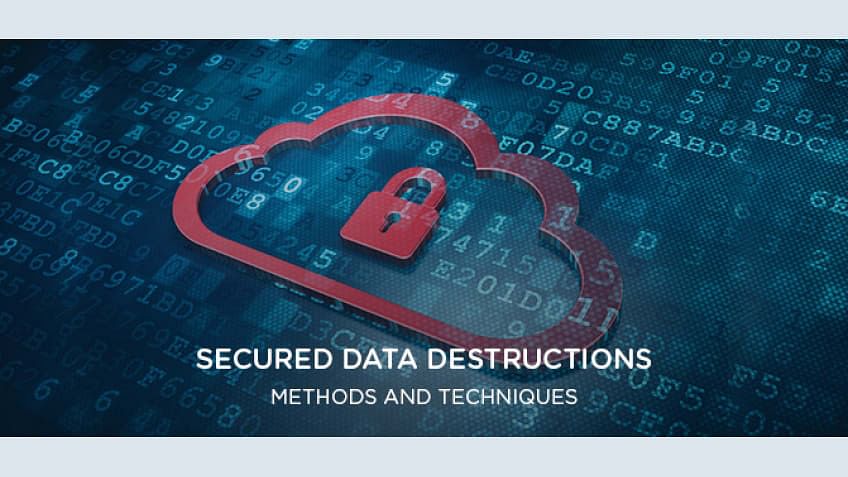Why Data Destruction is an Important Element of Comprehensive Cyber Security
Why Data Destruction is an Important Element of Comprehensive Cyber Security
Blog Article
Discovering the Significance of Data Damage in the Context of Computer System Safety Services and Protecting Confidential Data
In an era where data breaches are increasingly common, the significance of effective information devastation can not be overemphasized. When no much longer required, Organizations must adopt rigorous actions to make sure that sensitive information is not only shielded during its lifecycle but additionally emphatically eliminated. The methods used for data eradication, paired with conformity to legal criteria, play a pivotal duty in maintaining confidentiality and depend on. Nonetheless, the ramifications of these practices prolong beyond simple compliance, affecting a business's credibility and functional integrity in the electronic marketplace. What techniques can companies execute to boost their data damage methods?
Understanding Data Damage
Information devastation is an important part of computer safety that entails the permanent elimination of information from storage space tools to stop unapproved accessibility and potential data breaches. In a progressively electronic landscape, companies encounter enhanced risks related to sensitive info being incorrectly accessed or manipulated. Reliable information destruction safeguards against these risks, making sure that personal dataâEUR" such as consumer information, copyright, and financial recordsâEUR" can not be recovered after disposal.
Understanding the significance of information devastation expands past plain conformity with regulative and legal frameworks; it is essential for maintaining business honesty and trust fund. When information is incorrectly handled or inadequately destroyed, the consequences can be severe, consisting of economic loss, reputational damages, and legal liabilities.

Techniques of Information Removal

One prevalent technique is data wiping, which includes overwriting existing information with arbitrary patterns numerous times. This strategy provides the initial data irretrievable, making it a popular choice for organizations seeking to safeguard secret information.
An additional approach is degaussing, which makes use of an effective electromagnetic field to disrupt the magnetic domains on storage devices, effectively erasing the data. This approach is specifically reliable for magnetic media but is not applicable to solid-state drives.
Physical devastation is another robust approach, squashing or including the shredding of storage devices. This approach warranties that information healing is practically impossible, making it ideal for highly delicate details.
Finally, file encryption can work as a corresponding strategy to data removal. By encrypting information prior to removal, companies can add an additional layer of security, making certain that even if remnants are recouped, they stay inaccessible without the decryption trick. Each technique should be picked based on the degree of data level of sensitivity and the certain safety and security needs of the company.
Legal Compliance and Information Security
Organizations have to navigate an intricate landscape of legal requirements associated with information security, particularly after implementing approaches of data obliteration. Various laws, such as the General Data Defense Policy (GDPR) and the Wellness Insurance Coverage Transportability and Accountability Act (HIPAA), enforce stringent standards on just how organizations have to handle and get rid of of delicate information. Failure to follow these laws can result in considerable lawful repercussions, consisting of significant fines and reputational damage.
Information devastation processes should be diligently recorded to demonstrate compliance with suitable regulations and standards. This documentation not only works as evidence of adherence to lawful commitments but also shows a dedication to guarding delicate information. Organizations should likewise establish clear policies relating to data retention and damage timelines, making certain that information is not held longer than needed.

Furthermore, regular audits and assessments of data devastation techniques are necessary to keep conformity and adapt to developing legal structures (data destruction). By proactively resolving lawful requirements, organizations can minimize threats connected with data breaches and show their commitment to data protection. Inevitably, prioritizing legal conformity in data destruction procedures is not simply a regulatory commitment, yet an essential aspect of a durable data security approach
Effect On Company Reputation
The online reputation of a company can be significantly influenced by its strategy to data destruction and administration. In today's digital landscape, where information breaches can happen at any moment, the failure to effectively dispose of delicate details can cause severe consequences. Organizations that inadequately handle information destruction threat exposing private customer info, which not just breaks personal privacy laws however additionally erodes depend on among stakeholders and customers.
A tarnished track record can cause decreased client commitment, as clients end up being reluctant to involve with a business that has actually shown negligence in securing their information. Negative publicity surrounding read review an information violation can have a long-term effect, as possible clients could be deterred by the perceived lack of safety and security. This can cause a straight decrease in profits find this and market share.
In addition, businesses that prioritize data devastation as part of their security strategy can enhance their reputation by showcasing their commitment to safeguarding sensitive information. By taking on rigorous information monitoring techniques, companies can not only reduce risks but also place themselves as reliable entities in their corresponding markets, thus strengthening their overall brand name photo.

Finest Practices for Secure Disposal
Executing ideal techniques for protected disposal of data is crucial for alleviating dangers connected with information breaches and ensuring conformity with privacy laws. Organizations must adopt a thorough data disposal policy that details procedures for both digital and physical information damage.
For physical information storage devices, such as hard disk drives, shredding or degaussing is advised to stop information healing. In addition, organizations need to preserve a chain of guardianship documents during the disposal procedure, ensuring responsibility and traceability of disposed items.
For digital information, using software application that follows industry criteria for information wiping is vital. This software must overwrite existing information multiple times, making healing basically impossible. It is also crucial to verify the effectiveness of the data devastation procedure through audits or third-party evaluations.
Educating staff members on secure disposal methods includes an additional layer of security, as human error can typically bring about data exposure. Frequently upgrading and reviewing disposal policies guarantees positioning with progressing laws and technical innovations. By implementing these best practices, organizations can considerably minimize the threat of unapproved data access and enhance their general data security method.
Final Thought
In verdict, information damage is an essential aspect of computer security services that makes certain the see it here protection of confidential information from unauthorized accessibility. Applying efficient techniques of information elimination, adhering to legal compliance, and identifying the effect on service online reputation are crucial parts of a detailed data security approach. By taking on finest practices for secure disposal, companies can promote trust with customers and secure sensitive information, eventually adding to an extra protected digital landscape.
In a period where data violations are progressively common, the relevance of efficient information damage can not be overemphasized.Data destruction is a critical part of computer protection that includes the permanent removal of data from storage gadgets to prevent unapproved access and prospective information breaches. Organizations should likewise develop clear policies pertaining to data retention and damage timelines, guaranteeing that information is not held longer than necessary.
By proactively attending to legal demands, companies can reduce threats associated with data violations and show their commitment to information security (data destruction). Eventually, focusing on legal compliance in information destruction processes is not simply a governing responsibility, however a basic element of a durable information safety and security method
Report this page